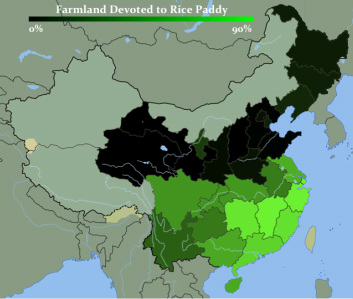
The Rice Theory of Culture
I argue that rice and wheat agriculture have given northern and southern China two very different cultures. Rice requires irrigation networks and about twice the number of man-hours as wheat, which gives rice farmers an economic incentive to cooperate and avoid conflict. I argue that this can explain the large cultural differences between northern and southern China.
Read the original article or write-ups in the National Geographic and The Economist.
See the TedX UVa talk.
I argue that rice and wheat agriculture have given northern and southern China two very different cultures. Rice requires irrigation networks and about twice the number of man-hours as wheat, which gives rice farmers an economic incentive to cooperate and avoid conflict. I argue that this can explain the large cultural differences between northern and southern China.
Read the original article or write-ups in the National Geographic and The Economist.
See the TedX UVa talk.

The power of money over psychology is stronger in WEIRD cultures
Money motivates people to work harder than psychology much more in Western cultures. For example, social norms are much less powerful than money in the US, but more similar to money in China and Mexico.
Read more.
Money motivates people to work harder than psychology much more in Western cultures. For example, social norms are much less powerful than money in the US, but more similar to money in China and Mexico.
Read more.

People misunderstand collectivism
People often mix up what I call "warm fuzzy" collectivism with responsibilities in close relationships, which I call "responsibilism." This confusion seeped its way into the most-used self-report scales to measure collectivism. It can explain why those scales often fail to find East-West differences.
Read more.
Or check out this podcast chat.
People often mix up what I call "warm fuzzy" collectivism with responsibilities in close relationships, which I call "responsibilism." This confusion seeped its way into the most-used self-report scales to measure collectivism. It can explain why those scales often fail to find East-West differences.
Read more.
Or check out this podcast chat.

Liberals and conservative think like they're from different cultures
I tested liberals and conservatives with measures of East-West cultural thought style and perception. I found that conservatives in the US thought more like East Asians, and liberals thought like extreme Westerners. The same was even true in China.
Read more.
Moving changes who we are
Shige Oishi and I study how moving makes us and our communities different. For example, people who have moved more tend to be more individualistic, donate less to the community, and think more analytically.
Read more.
